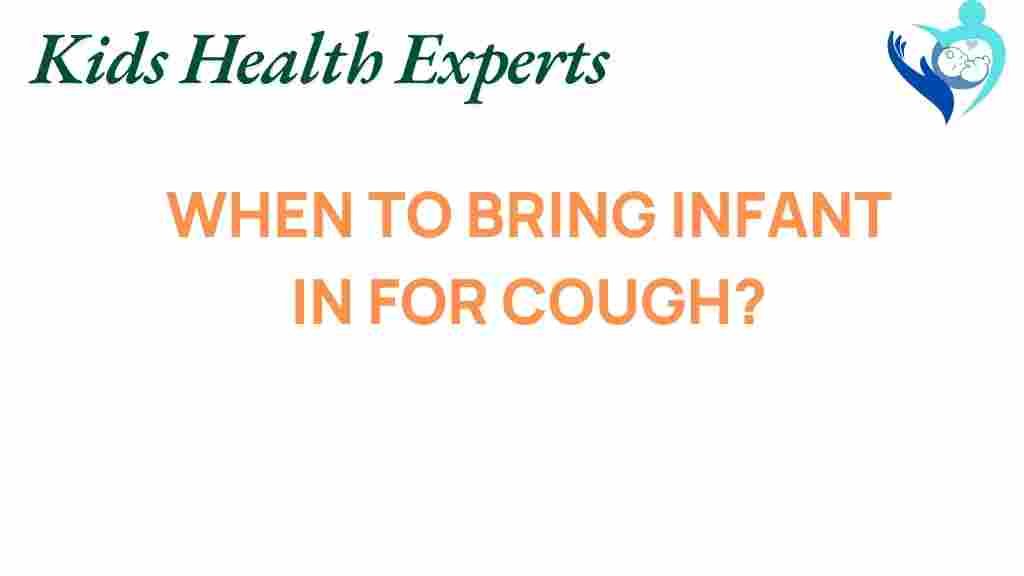Understanding When to Seek Help for Your Baby’s Cough: Insights on Infant Cough
As a caregiver, noticing your infant cough can be a distressing experience. A cough in a baby can arise from various causes, ranging from mild irritation to more serious respiratory issues. Understanding when to seek help for your baby’s cough is crucial for ensuring their health and wellness. In this article, we will explore the causes of infant cough, when to seek pediatric advice, effective cough remedies, and essential caregiver tips to promote child wellness.
Recognizing the Causes of Infant Cough
The first step in addressing an infant cough is to understand its potential causes. Here are some common reasons why your baby might be coughing:
- Common Cold: Viral infections are common in infants and can lead to coughing.
- Allergies: Environmental allergens like dust mites or pet dander may irritate a baby’s airways.
- Respiratory Infections: Conditions like bronchitis or pneumonia can cause persistent cough.
- Asthma: Although less common in infants, asthma can manifest as chronic coughing.
- Acid Reflux: This can lead to coughing due to irritation in the throat.
Understanding the Type of Cough
Identifying the type of cough can provide valuable clues about its cause. Here are some types of coughs you may encounter:
- Dry Cough: Often associated with allergies or irritants.
- Wet Cough: Usually indicates mucus or phlegm in the lungs.
- Whooping Cough: A serious bacterial infection that causes intense coughing fits.
When to Seek Pediatric Advice
Knowing when to consult a pediatrician is essential for baby health. Here are specific situations when you should seek help:
- If the cough persists for more than a week.
- If your baby is less than 3 months old and has a cough.
- If the cough is accompanied by a high fever (over 100.4°F or 38°C).
- If your baby is having difficulty breathing or wheezing.
- If your baby is coughing up blood or has a change in color (blue or gray).
- If the cough disrupts your baby’s sleep or feeding.
In these scenarios, it’s important to reach out to your pediatrician for advice. Early intervention can help prevent complications and ensure your child’s wellness.
Caregiver Tips for Managing Infant Cough
As a caregiver, there are several strategies you can employ to help manage your baby’s cough at home:
- Keep Them Hydrated: Ensure your baby drinks plenty of fluids to help thin mucus.
- Use a Humidifier: Adding moisture to the air can ease coughing, especially during dry seasons.
- Elevate Their Head: For older infants, slightly elevating the crib mattress can help ease nighttime coughing.
- Avoid Irritants: Keep your baby away from smoke, strong odors, and allergens.
- Monitor Symptoms: Keep track of your baby’s cough, noting any changes or new symptoms.
Natural Cough Remedies for Infants
While it’s essential to consult a pediatrician for persistent coughs, some natural remedies may provide relief:
- Honey: For infants over one year old, honey can soothe the throat and reduce coughing.
- Warm Fluids: Warm water or herbal teas can help soothe throat irritation.
- Saline Drops: Saline nasal drops can relieve nasal congestion, potentially easing cough.
Always consult your pediatrician before trying any remedies to ensure they are safe for your baby’s specific needs.
Troubleshooting Coughing Issues
If you notice your baby coughing frequently, consider the following troubleshooting tips:
- Check for Allergens: Identify and minimize exposure to allergens in your home.
- Review Medications: Make sure any medications your baby is taking do not have coughing as a side effect.
- Evaluate Feeding Practices: If your baby has acid reflux, changing feeding positions or types of formula may help.
When to Call for Emergency Help
In some cases, a cough can indicate a serious condition. You should seek immediate medical help if your baby experiences:
- Severe difficulty breathing or gasping for air.
- Blue or gray discoloration of the lips or face.
- Unresponsive or lethargic behavior.
- High fever that does not respond to medication.
In these instances, do not hesitate to call emergency services or rush to the nearest hospital.
Conclusion
Understanding when to seek help for your baby’s cough is vital for maintaining their health and wellness. By recognizing the causes of infant cough and knowing the signs that require pediatric advice, you can play an active role in your child’s health. Implementing caregiver tips and home remedies can help alleviate mild coughs, but always prioritize your baby’s safety by consulting with a pediatrician when in doubt.
For further information on baby health and wellness, consider visiting this resource. It’s essential to stay informed and proactive in caring for your child’s respiratory health.
By staying attentive and informed, you can help ensure your baby remains happy and healthy, even during bouts of coughing. Remember, your pediatrician is your best resource for any concerns regarding your child’s health.
This article is in the category Care and created by KidsHealthExperts Team
